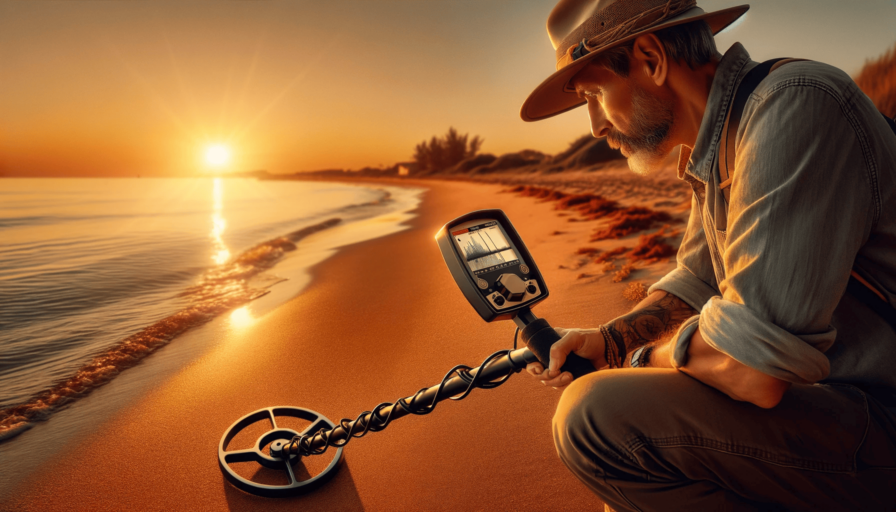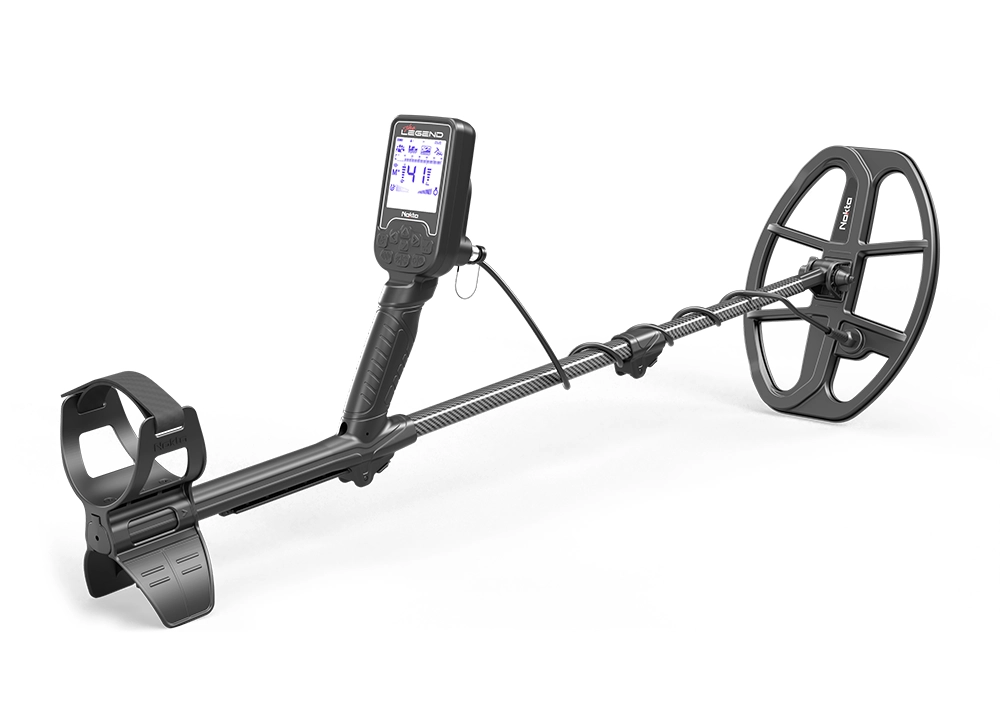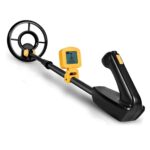If you’re on looking to find the best metal detector in 2024 has to offer, you’ve landed in the right spot. Whether your particular interests lie in beach metal detecting, relic hunting, or gold prospecting, there’s an array of options that cater to both seasoned detectorists and those new to the hobby. Understanding the nuances of this equipment can be the difference between an ordinary outing and an exciting discovery.
Best Metal Detectors of 2024 – Reviews and Buyer’s Guide
Affiliate Disclosure: We earn from qualifying Amazon purchases. We only recommend products that we truly believe in.
Where to Begin in Selecting a Good Metal Detector?
If you’re set on purchasing a metal detector, the world of treasure hunting eagerly awaits you. Yet, as a beginner detectorist, the vast array of choices might feel overwhelming. A metal detector is not just a purchase; it’s an investment in a hobby that can yield years of enjoyment. Your first step is recognizing the right features that make friendly metal detecting a reality for a novice.
Familiarizing yourself with essential terminologies such as “ferrous,” “non-ferrous,” “frequency,” and “ground balance” is fundamental. These terms will help guide you through the specifications of detectors and enable you to make a more informed decision when you buy a metal detector.
- Opt for a machine known for its ease of use
- Ensure the model offers a durable build for longevity
- Automatic ground balance is a feature that can simplify your early experiences
- A comfortable weight and ergonomic design can enhance your detecting sessions
Among the reputable options for a first-timer, consider the Garrett ACE 400. This detector is renowned for its backlit screen and intuitive controls—qualities that make it both effective and a metal detector for the beginner. Its automatic ground balance will save you from complicated manual adjustments, letting you focus on the excitement of the find.
Remember, the key to a successful start in this absorbing pastime is not simply to buy a metal detector, but to choose one that will be your partner in adventure, tailored to your fledgling needs and brimming with potential for discovery.
How much does a metal detector cost?
The short answer is anywhere from $200 to $1500 USD and beyond. Initial investments can start from modest sums for entry-level models to substantial amounts for high-end equipment. It’s all about finding a balance between cost and the best detector for your specific needs.
- For those cautious about cost, the Garrett AT Pro offers a sweet spot at a moderate price point (~$500). It’s a solid all-rounder good for various detecting scenarios.
- The Minelab Vanquish 440 Metal Detector emerges as another best for value contender being multi-frequency and waterproof. (~$300).
- When you’re ready to upgrade, the XP Deus II might be a significant investment, but for serious detectorists, its precision, depth, and quality features could be worth the extra cost (~$1200-1500)
Remember that the best machine isn’t just about the purchase price. Consider ongoing expenses such as maintenance, accessories—like headphones and detector bags—and potential part replacements which collectively contribute to the worth of your detector over time.
Where Will You Use Your Metal Detector?
The location where you plan to detect is a major determinant in choosing the ideal equipment. As you contemplate places to metal detect, it’s worth noting whether you’ll be combing the sandy stretches of a beach, hitting up a ghost towns for relic detecting, or an underwater saltwater treasure hunt.
Freshwater search enthusiasts and those expecting to rack up shallow water finds will look for full or coil-only waterproof metal detectors.
If you plan to search in different types of terrain, versatility becomes key. A metal detector that has many uses and can handle an array of environments, from humid beach fronts to rocky inland soil, will be your ally. For those inclined towards the allure of the ocean, the Minelab Vanquish 440 comes highly recommended entry and beginner level. Built to counteract the challenges posed by saltwater mineralization.
- Beach and saltwater hunting demands waterproof coil and multi-frequency machines to combat mineralization
- For freshwater, the Garrett ACE series offers the durability of waterproof coils, perfect for any wet environment venture.
- To navigate multiple environments, seek detectors boasting a wide array of functions, ensuring preparedness for any terrain.
Ultimately, your choice in a metal detector should match up to your intended adventure locations, enhancing your efforts and bolstering the chance of a bountiful harvest of relics, coins, or whichever treasures you seek.
Best All Around Metal Detector
Minelab Equinox 800
Key Features:
- Multi-frequency technology
- 4 detection modes: field, park, gold, beach
- Large, easy-to-read LCD
- Waterproof design, up to 10 feet
- Rechargeable Lithium-ion battery, ~12 hours
Pros:
- Adaptable to all terrains
- Fast recovery speed with accurate Target ID
- Customizable frequency settings
Cons:
- Not the most portable
- Can be challenging for intermediates and experts
Summary:
The Minelab Equinox 800 is celebrated for its innovative multi-frequency technology and versatility across different terrains, including beaches and goldfields. Its depth indicator and large LCD enhance usability, but the battery life and complexity might challenge some users.
Best Entry Level Metal Detector:
Minelab Xterra Pro
Key Features:
- Submersible to 16 feet
- Switchable frequency technology
- Compatible with Equinox and Vanquish coils
- Internal Lithium-ion battery, ~12 hour
- 2.9lbs (1.3kg)
Pros:
- Good for both new and experienced users
- Budget-friendly option for beach detecting
- Fully waterproof
- Lightweight, Compact design
Cons:
- Lacks simultaneous multifrequency option
- Coins don’t always sound better than bottle caps.
Summary:
The Minelab Xterra Pro stands out for its submersibility and compatibility with multiple coil types. It’s excellent for a range of detecting activities but lacks the multifrequency option of other models.
Garrett Ace 400
Key Features:
- DD search coil
- Iron Audio system
- Digital Target ID and depth indicator
- Adjustable frequency up to 10 kH
- 4x AA batteries (20-40 hour life
- 2.7lbs (1.2kgs)
Pros:
- Enhanced performance and sensitivity
- Easy-to-use control box
- Flexible iron and notch discrimination
- Submersible (waterproof) coil
- Affordable price
Cons:
- Control box is not waterproof
- Lacks a ground balance system
Summary:
The Garrett Ace 400 offers a balance between affordability and advanced features like Iron Audio and Digital Target ID. Its user-friendly design is ideal for beginners, although it can’t be fully submerged.
Best Budget Metal Detector
Garrett ACE 250
Key Features:
- Graphical target display
- Depth indicator
- Built-in pinpointer feature
- VLF technology at 6.5 kHz
- 4x AA Batteries, 20-40 hours
- 2.7lbs (1.2kgs)
Pros:
- Simple notch discrimination
- Submersible coil
- User-friendly with various search modes
- Very affordable
Cons:
- No adjustable operating frequencies
- Control box is not waterproof
- Lacks a ground balance system
- No noise projection
Summary:
The Garrett ACE 250 is an excellent entry-level detector, offering simplicity with effective features like a built-in pinpointer and graphical target display. It’s perfect for beginners but has limited advanced capabilities.
Minelab Vanquish 440
Key Features:
- Multi-IQ technology
- Includes Bluetooth wireless headphone pairing
- 12″ DD Coil
- 25 Discrimination Segments
- 4x AA batteries, ~10 hours
- 2.6lbs (1.2kg)
Pros:
- Simple but with all the features
- Lightweight and ergonomic design
- Easy to transport
Cons:
- Not totally waterproof
Summary:
The Minelab Vanquish 440, with its Multi-IQ technology and extensive discrimination segments, offers advanced features in a user-friendly package, though it’s not fully waterproof.
Best Metal Detector for Coins and Relic Hunting
Nokta Legend
Key Features:
- Multi Frequency with 5 single frequencies
- Waterproof up to 10 feet
- Manual/Auto Ground Balance, Pinpoint Mode
- 16 Polyphonic Audio Tones
- Clock and time tracking included
- Uses Lithium Polymer Batteries (USB Charging) ~12 hours
- 3 lbs (1.4kg)
Pros:
- Vibration mode for the whole detector
- Affordable
- Interchangeable coils
Cons:
- Headphones included are not of the best quality
- Tones can sound harsh and be confusing
Summary:
The Nokta Legend offers multi-frequency capabilities and a waterproof design up to 10 feet, making it versatile for various detecting conditions. It’s notably affordable and user-friendly with a new FerroCheck feature and time tracking.
Garrett ACE Apex
Key Features:
- Multi frequency plus multi-salt
- Powerful waterproof DD coil
- Six search modes plus pinpointer
- Built in rechargeable lithium-ion Battery (mini-usb), ~15 hours
- 2.5lbs (1.1kg)
Pros:
- Classic but improved Garrett Ace design
- Z-Lynk technology for wireless headphones
- Lightweight with a rechargeable battery
- Very pricy
Cons:
- The control box is not waterproof, only “rainproof”
- smaller ranges
Summary:
The Garrett ACE Apex enhances the classic Garrett design with multi-frequency capabilities and a unique DD coil. It’s suitable for various terrains and conditions, offering convenience with wireless headphones and a lightweight design.
Garrett ATX
Key Features:
- Waterproof up to 10 feet
- 25 Discrimination modes
- Collapsible shaft for easy transport
- 8x AA batteries. Comes with rechargeable AA and charger. ~10 hours
- 6.9lbs (3.1kg)
Pros:
- Amazing depth capabilities of various conditions
- Compatible with 5 search coils
- Can be powered by rechargeable or AA alkaline batteries
Cons:
- No LCD display
- Heavy and challenging for lengthy search sessions
- Premium price point
Summary:
The Garrett ATX is a robust metal detector, waterproof up to 10 feet and featuring 25 discrimination modes for precision. Its collapsible shaft adds to its portability, but the absence of an LCD display and its heavy build might limit its usability.
Best Metal Detector for Beach
Garrett AT Pro
Key Features:
- Waterproof up to 10 feet
- Pinpoint mode included
- Frequency shift available
- Automatic / Manual ground balance
- 4x AA Batteries ~16 hours
- 3.03lbs (1.4kg)
Pros:
- Compatible with additional coils
- High recovery speed
- Suitable for gold prospecting
Cons:
- Only one operating frequency
- Somewhat outdated technology
Summary:
The Garrett AT Pro is a versatile detector, waterproof and equipped with a pinpoint mode for precision. While it excels in gold prospecting, its limitation to a single frequency and slightly outdated technology might be drawbacks for some users.
Vanquish 540
Key Features:
- Multi-IQ Technology
- 12″ DD Coil
- 25 Discrimination Segments
- Waterproof coil
- Bluetooth wireless headphone compatible
- 4x AA rechargeable ~12 hour life
- 2.9lbs (1.3kg)
Pros:
- Iron Bias and Audio Control
- Bluetooth Wireless Headphones
- Easy to use
Cons:
- Not totally waterproof
Summary:
The Vanquish 540 leverages Multi-IQ Technology and a 12″ DD Coil for efficient detection. It’s well-suited for varied terrains, but its lack of full waterproofing may limit its use in certain environments.
Best Waterproof Metal Detectors
Waterproof Pulse Induction Metal Detector
Fisher CZ-21
Key Features:
- Dual-frequency VLF technology
- Freshwater and Saltwater submersible up to 250 feet
- Enhanced sensitivity to gold and fine jewelry
- Hip-mountable control housing
- 4x 9v Batteries ~40hours
- 5lbs (2.3kg)
Pros:
- Easy to use
- Ideal for underwater treasure hunting
- Robust design suitable for harsh conditions
- Fully Submersible
- Durable
Cons:
- Heavy
- Premium price point
Summary:
The Fisher CZ-21 is a powerhouse for underwater detecting, excelling in both saltwater and freshwater conditions. Its dual-frequency technology and enhanced sensitivity make it a top choice for divers and serious treasure hunters. However, its weight and cost may be considerations for casual hobbyists.
Waterproof Multi-Frequency Metal Detector
Minelab Excalibur II
Key Features:
- BBS Technology, 17 Frequencies (1.5-25.5 kHz)
- 8″ DD Search Coil,
- Freshwater and Saltwater submersible up to 200 feet
- 2 Search Modes: All Metal/Discrim
- Automatic Ground Tracking, Pinpoint Mode
- Hip mountable option
- 1 Audio Tone
- NiMH rechargeable battery pack, ~12 hour life
- 4.6 lbs (2.1kg)
Pros:
- Fully Submersible
- Easy to use
- Durable
Cons:
- Heavy
- No additional coils
- Not suitable for gold
Summary: The Excalibur II excels in underwater conditions with its waterproof capability and fluorescent design. Its multiple frequencies and automatic ground tracking make it suitable for serious treasure hunters, though its price and lack of software updates may deter some users.
Best Metal Detector for Kids
Nokta Mini Hoard
Key Features:
- VLF Technology, Single 15 kHz Frequency
- 7″ Mono Search Coil, IP68 Waterproof
- 3 Search Modes, Fixed Ground Balance
- Pinpoint Mode, 3 Audio Tones
- Uses 2 AA Batteries, ~12 hours
- Weight: 1.9 lbs
Pros:
- Waterproof up to 3 feet
- Lightweight, ideal for kids
- Durable
- Real metal detector-like performance
Cons:
- No volume control for Mini Hoard
Summary: The Nokta Mini Hoard is an affordable, kid-friendly detector with basic features suitable for beginners. Its lightweight design and waterproof capabilities make it a great starter detector, though the lack of volume control might be a minor drawback.
RM Ricomax Junior Metal Detector
Key Features:
- VLF Single Frequency (~6 kHz)
- 3 Search Modes: All Metal, DISC, PinPoint
- Adjustable Sensitivity, Target ID
- Water-resistant (not waterproof)
- 2.31 lbs (1kg)
Pros:
- Lightweight, good for older kids
- Simple format, ideal for beginners
- Inexpensive
Cons:
- Not fully waterproof
- Limited depth detection (up to 8 inches)
- No volume control
Summary: The Ricomax Junior is a beginner-friendly, lightweight detector suitable for shallow water, coins, and jewelry. Its simplicity and affordability make it a good choice for beginners and older kids, though its limited depth capability and water resistance might be restrictive for more advanced uses.
Best Metal Detector for Gold
Minelab Gold Monster 1000
Key Features:
- 45 kHz Frequency
- Automatic ground balance
- Two Coils Provided, Adjustable Length
- Can be powered by Li-ion or AA batteries
- Gold Detection with Unique Discrimination
- 8x AA Batteries
- 2.94lbs (1.3kg)
Pros:
- Easy to start and use, highly adjustable
- Lightweight
Cons:
- Not completely waterproof
- Factory headphones of average quality
Summary: The Gold Monster 1000 is known for its ease of use, adjustability, and lightweight design. It’s particularly sensitive to gold, making it a great choice for gold prospecting. However, its limitations in waterproofing and the average quality of included headphones may be considered drawbacks.
Garrett AT Gold
Key Features:
- VLF Technology, 18 kHz Frequency
- 8.5″x11″ DD Search Coil, Waterproof up to 10 feet
- 3 Search Modes
- Auto/Manual Ground Balance
- Pinpoint Mode, 3 Audio Tones
- 4x AA Batteries
- 2.8 lbs (1.3kg)
Pros:
- Optimal frequency for prospecting
- Lightweight and waterproof
- Well built and easy to use
Cons:
- Not recommended for saltwater use
- Only one operating frequency
Summary: The Garrett AT Gold is a versatile detector with an optimal frequency for gold prospecting. Its lightweight design and waterproof capabilities up to 10 feet are notable features. However, its single frequency and limited use in saltwater environments might be seen as limitations.
The Best High End Metal Detector
XP Deus II
Key Features:
- FMF® Technology, 49 Frequencies (4-45 kHz)
- XP 9″/11″ FMF Coils
- Waterproof up to 65 feet
- 24 Search Modes, Manual/Auto Ground Balance
- Low latency bluetooth
- Pinpoint Mode, 5 Audio Tones
- Lithium Batteries, Adjustable Length ~30 hours
- 2.18 lbs (1kg)
Pros:
- Fast Multi Frequency technology
- Mineralization stability
- Extremely versatile
- Waterproof
- Bone conduction headphones
- Bluetooth pinpointer pairing capability
- lightweight
Cons:
- High price
- Challenging for newer users
- Incompatible wireless search coils with previous Deus models
Summary:
The XP Deus II stands out with its advanced FMF technology, offering a wide range of frequencies for versatile detecting. Its waterproof capabilities and innovative bone conduction headphones are significant advantages. However, the high price and compatibility issues with previous Deus models’ coils may be considered downsides.
Metal Detectors for Kids
Introducing your kids to the exciting world of treasure hunting is a sure way to spark their curiosity and passion for exploration. To ensure a rewarding and frustration-free experience, it’s essential to choose a first metal detector that’s not only beginner-friendly but also simple to use. The ideal youth detector combines lightweight construction for easy handling with user-friendly features that cater to their budding interest.

Show a group of kids having a blast as they use a metal detector to find hidden treasures on a sandy beach. The kids are all smiling and eagerly digging into the sand, while the metal detector beeps excitedly. In the background, there are palm trees and blue skies, indicating a beautiful day for treasure hunting. The metal detector should look colorful and playful, with fun details like stickers or cartoon characters.
Finding a fun to use metal detector can lead to hours of outdoor activity and learning. For instance, brands like Nokta Makro understand the importance of providing a straightforward experience with their Simplex+ WHP Waterproof Detector, designed for all terrains. It not only helps you instill a love for the hobby in your kids but also teaches them valuable lessons about history and the environment.
- Seek out detectors that offer a clear display to make it easy for kids to interpret signals.
- Choose models that are sized appropriately for children to handle without fatigue.
- Consider detectors with preset search modes to simplify the learning process.
A lightweight detector with simple controls allows kids to focus on the thrill of discovery without being bogged down by complex functionality. When equipped with the right tools, your young adventurers are set up for an enjoyable and potentially lifelong hobby. Remember, fostering a sense of achievement in children as they unearth their finds is the foundation for a sustained interest in metal detecting.
Metal Detecting Proficiency Levels
As you embark on the journey of metal detecting, it’s imperative to choose a detector that aligns with your expertise. For those new to this exciting hobby, beginner metal detecting units are designed to be particularly accommodating. You need a detector that is the perfect fit to navigate what can be a pretty steep learning curve. Something straightforward, with clear settings and instructions, will make the process much smoother, allowing you to focus on the joy of the hunt.
Experienced detectorists, on the other hand, might seek out the complexity and advanced capabilities of more sophisticated models. These detectors, equipped with a myriad of features, match the seasoned pros’ ability to discern and utilize nuanced functional enhancements for a fine-tuned treasure-seeking experience.
- For beginners, simplicity is always the best choice, allowing you to gain experience without feeling overwhelmed.
- Considers if the metal detector has many features that match your current skill set, or if it offers a growth path as you develop more expertise.
- Don’t forget accessories like metal detecting headphones that can augment your detecting sessions, especially in busy environments.
Remember, the right tools can make a significant difference. Whether pursuing gold prospecting, beach treasure hunts, or historical relic searching, having the ideal detector for your level of experience enhances your entire adventure.
Application & Intended Use
Your quest for the perfect metal detector should begin with defining the specific application and intended use. Whether you’re swept up in the thrill of a treasure hunting adventure or methodically searching for different types of metal, the metal detector you choose must align with your goals.
For those drawn to the allure of finding gold rings or embarking on a buried treasure search, pinpoint accuracy and sensitivity to specific types of metal are paramount. Metal objects detection beneath the earth requires sophisticated technology that can discern precious metals from mere trinkets.
- Metal detectors like the Garrett ACE APEX are engineered for the nuanced needs of gold prospecting, capable of detecting small gold nuggets with precision.
- If your adventure takes you to historical sites, an all-purpose metal detector with adjustable frequencies may be your best ally in coin shooting.
- For beach hunters, a detector with a ground balance feature will help overcome the challenge of mineralization in the sand, making lost jewelry finds more attainable.
Selecting the right device is about matching its features—such as discrimination settings, depth capabilities, and tuning options—to the environment where you’ll be most active, and the treasures you aim to unearth.
Remember, your metal detector is your trusty partner in this journey. Beyond the excitement of a beep, it’s the reliability, adaptability, and technical prowess that turn potential leads into tangible rewards. Dive into your metal detecting journey with a discerning eye and a detector that suits your quest for the undiscovered.
Detection Technology
As you dive into the world of metal detecting, the options can be overwhelming, but understanding the technologies behind your detector will help you make the best choice for your adventures. Consider VLF metal detectors, such as the Garrett ACE 300, which are renowned for their ease of use and effectiveness in a variety of settings, making them an ideal choice for beginners and enthusiasts alike.
PI metal detectors, on the other hand, are designed to conquer highly mineralized ground conditions and are favored for their impressive depth and sensitivity, especially when it comes to locating precious gold nuggets. For those who traverse a range of environments and look for versatility in different modes of detection, MF metal detectors stand out with their adaptability, ensuring reliable performance wherever your treasure hunting may lead.
- Understand how VLF metal detectors function best in low mineralization
- Discover why PI metal detectors are the go-to for gold prospecting
- Explore the advantages of MF metal detectors in varied terrain
Further bridging the gap between enthusiast and expert, learning about advanced detecting features and embracing new detector technologies can enhance your detecting experience. From automated ground balance to improved discrimination between different types of metals, the innovations in modern detectors aim to boost efficiency and maximize your finds.
Ultimately, the right detector for you depends on where and what you plan to search. Whether you’re investigating an old battlefield, combing the beach, or searching for lost jewelry in a park, there’s a technology that fits your purpose. By recognizing the subtle nuances between detectors, you ensure a more fruitful search and potentially unearth treasures that have remained hidden just beneath the surface.
Key Technology Features Explained
As you dive into the world of metal detecting, understanding the key technology features that enhance your search is imperative. Coils, for instance, are the lifeblood of your detecting game, with size and type significantly determining your success. But there’s more to consider—each aspect of your metal detector’s design impacts its performance and your overall experience.
Search Coils
The coil is your metal detector’s gateway to unearthing hidden treasures. Its size and type are pivotal: smaller coils are excellent for sensitivity and navigating through trash-laden areas, while larger coils improve depth detection and cover more ground. Specialized coil types like waterproof and submersible search coils extend your treasure hunting to varied environments, ensuring no potential find is beyond reach. When assessing coil size, consider the terrain and the type of metal you’re questing for.
Other Considerations
Yet, there’s much more to mull over beyond just coils. Comfort and ease of use come from an ergonomic design, which can be the difference between a lengthy outing and a short-lived trip. Reliable metal detectors boast long-lasting battery life, providing uninterrupted search time. Features such as a headphone jack for focused listening, a sturdy digger tool for excavation, and a dependable metal detector bag for transport contribute to the device’s overall durability and your convenience.
Additional Research
Before purchasing metal detectors, extensive research is a step you can’t overlook. Today’s market, abundant with the latest metal detector models and advanced features, requires sifting through comprehensive metal detecting guides and expert tips. Consider the experiences shared by veteran detectorists and user reviews that can offer unparalleled insights. The investment in a reliable metal detector, after all, is an investment in the adventures that await you.


















